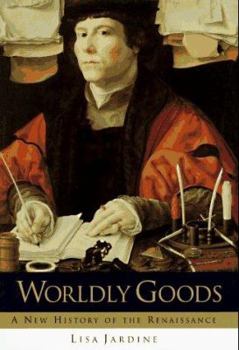Worldly Goods
Select Format
Select Condition 
Book Overview
"Fascinating . . . Jardine's attention to the material side of things is an important explanatory complement to the many histories of the period that have dwelt on the sublime works of art . . . Real... This description may be from another edition of this product.
Format:Hardcover
Language:English
ISBN:0385476841
ISBN13:9780385476843
Release Date:November 1996
Publisher:Nan A. Talese
Length:470 Pages
Weight:2.35 lbs.
Dimensions:1.5" x 6.8" x 9.6"
Customer Reviews
4 ratings
Money and Wealth talk
Published by Thriftbooks.com User , 22 years ago
Lisa Jardine's book "Worldly Goods" is in itself a refreshing view of the Renaissance. The typically structure of the period is to lecture on the enlightement of thought, such Erasmus, or political change as seen with the republics established in the northern Italian cities. Mostly though the Renaissance is connected with the explosion of art. However, Jardine clearly shows that the concept of personal wealth through materialistic possesion is not something new and had a greater influence on the Renaissance period then many would have realized. Her writting style is also a strength of the book as I found it fairly easy to get through in a short period.
The Early Stages of Consumption!
Published by Thriftbooks.com User , 24 years ago
If you sometimes feel that the modern age is spiritually bankrupt, what with all the conspicuous consumption and "keeping up with the Jones's" that goes on and if you yearn for earlier and simpler times- well, you might find this book a bit of a revelation. Ms. Jardine shows us that even back in the 15th and 16th centuries wealthy people wanted to acquire all the art, jewelry,books, etc. they could afford and when they got carried away even more than they could afford. Kings and princes would borrow beyond their means and die surrounded by opulence and debt. Collectors of beautiful objects would become so obsessive that they sometimes could not wait for other wealthy people to die so that they could get their hands on their collections too! People would even collect books as status symbols. A wealthy nobleman might retain a scholar to travel through Europe to buy the "right" books to add to his library. These would be in Latin and Greek. The fact that the nobleman might not be capable of reading the language in question wouldn't matter for the book would look good in his library. Ms. Jardine has an engaging style and the book is beautifully illustrated. My only complaints are that the section dealing with printing tends to give some obvious historical information which is not central to the books thesis and that as you near the end of the book you may feel that things are becoming a bit repetitious. But overall I found the book very enjoyable!
The more things change, the more they stay the same...
Published by Thriftbooks.com User , 26 years ago
As someone who has been teaching the history of the arts for many years, the Renaissance is often a frustrating period to teach. Most of the histories stress the "Great Men" approach, discussing the "genius" of Leonardo, Michaelangelo, et al, as though these dudes had been beamed into Italy from the planet Krypton. Lisa Jardine has finally anchored the artistic and humanistic achievements of the Renaissance in the believable realities of the rise of commodities trading, political gamesmanship, mutlicultural curiosity, and emerging market savvy, making the Renaissance sound remarkably like the present day. Jardine permits us to see Renaissance art in the same terms that the patrons who commissioned these works saw them, which is no small achievement. Her discussion of the relation between Luther's critique of the Pope and the rise of German business interests is quietly brilliant. On top of all this, the book is lusciously illustrated, a treat for the eye as well as the mind. If you think you just don't "get" the Renaissance, you need to read this book, for Jardine has provided us with insights not just into the past, but into how we think and act today.
A beautiful book with an intriguing view of the Renaissance
Published by Thriftbooks.com User , 27 years ago
This is an absolutely beautiful book -- almost worth buying for the quality of the paper and print and the illustrations alone. But it's more than that. The initial chapters on the role of the Eastern Church in preserving Greek learning and its transmission to the West are fascinating and revealing. The overall theme -- that the engine of the Renaissance was acquisition, not some abstract desire for learning -- is less well played out, but nonetheless well worth pondering. A wonderful history in the Barbara Tuchman style: educated, provocative and highly readable




